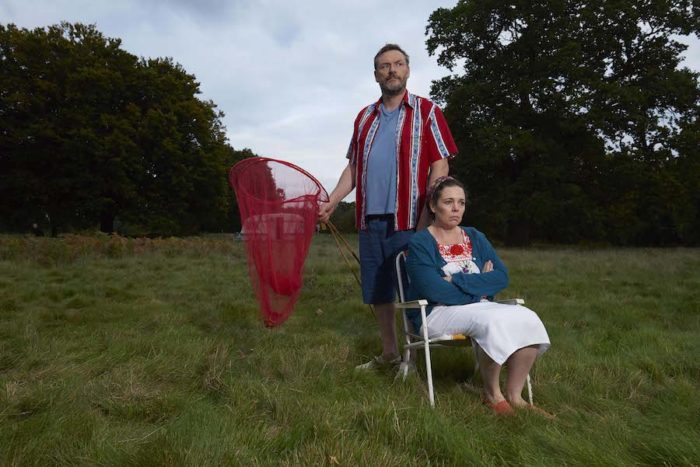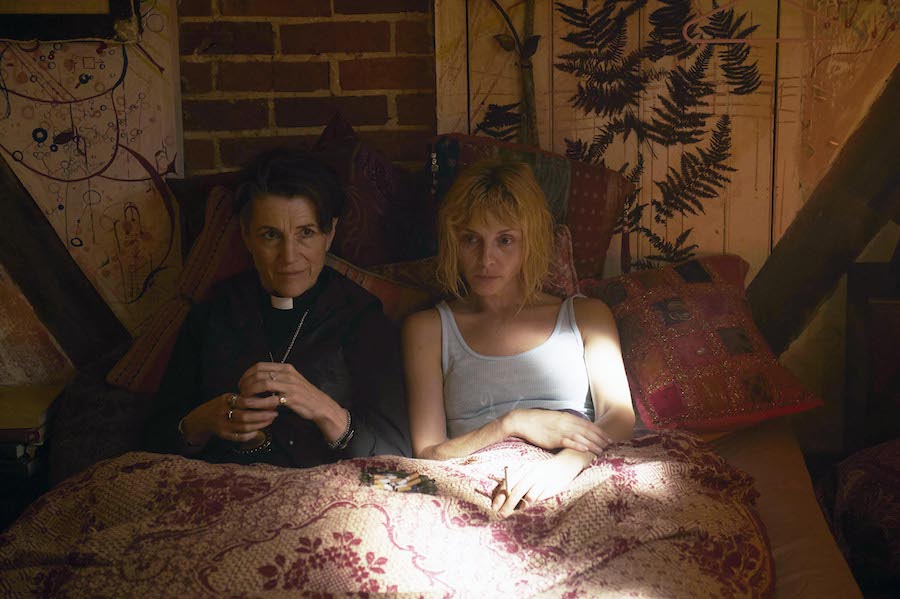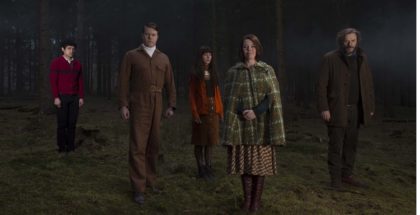UK TV review: Flowers Season 2

Review Overview
Imagination
8Depression
8Support
8Rating
David Farnor | On 17, Jun 2018
Warning: This contains spoilers for Season 1 of Flowers. Read our spoiler-free review of the first season here.
“You help me start again, because you feel… difference,” Shun (Will Sharpe) tells Maurice (Julian Barrett) in Season 2 of Flowers. Difference is a good word to sum up Channel 4’s dizzyingly unique series, which manages to be a comedy about tragedy, and oftentimes a tragedy about the laughable comedy of existence.
Season 1 saw Maurice attempt (and fail) to commit suicide, after years of struggling with depression. Never telling his wife, Deborah (Olivia Colman), about it, the result made her as miserable as him, and left their kids, Donald (Daniel Rigby) and Amy (Sophia di Martino), equally sad, starved of affection and resentful of everyone around them.
Can the family survive the challenge of helping Maurice with his mental health issues? That unanswered question ended Season 1 on a surprising note of hope, as the Flowers clan seemed to reconcile and band together. Season 2 delves into the messiness of what that united front actually looks like in practice – and, almost immediately, it becomes clear that it means division.
We open with Deborah and Maurice on a caravan holiday, but it only paves the way for an unhappy homecoming, as Deborah reveals that she cannot deal with all of this anymore. Instead, she’s exorcising her demons by writing a book – called, hilariously unsubtly, “Living with the Devil” – and trying to strike out on her own. And so Maurice does the same, falling in with the crowd surrounding Amy and her band (part orchestra, part experimental art project), called The Baumgaertners, after her grandfather.
Questions of heritage and inheritance are raised by what emerges as the vivid, colourful tale of Amy’s descent into madness – to what degree is her own mental health influenced or precipitated by her father’s (or grandfather’s)? To what extent do families pass down the burden of supporting each other through the generations? Or, by expressing her feelings, her obsession with her ancestry, and channeling it into strange art, is the lightning-struck Amy the most adjusted member of the Flowers bunch?
Donald, certainly, is doing a worse job at venting his frustrations: he spends his days running his own (terrible) plumbing firm, his nights shouting at Amy’s friends and collaborators, and the rest of his time hitting on a customer he used to fancy at school. Sophia di Martino is heart-wrenchingly vulnerable as Amy, the exact opposite of Daniel Rigby, whose uptight masculine presence becomes amusingly and disturbingly toxic – his version of flirting, we learn, involves insulting people and pushing them away. Then pumping sewage out of their sinkholes, while stroking his moustache.
It’s not all about the kids, though, as we see Deborah trying to forge a new future away from the spectres of the past. Her book launch, however, only brings more doubt and uncertainty – awkward Q&As with fans bring to light all the problems Deborah has been trying to brush under the carpet, not to mention asking all-important questions about her right to tell someone else’s story.
Olivia Colman is simply marvellous, switching from prickly and embarrassed to stoic and, finally, to broken, bringing nuance and pathos to a role that could easily have been two-dimensional or mere comic relief. Julian Barratt, meanwhile, once again delivers the best performance of his career. He’s perfectly cast in the lead role of Maurice, his morose, downbeat turn of Season 1 given a surprising lightness here, as we see the glimpses of positivity he experiences, as he learns to talk about his depression.
But it’s not that simple, and Flowers would never claim it is. While this remains a programme about opening up – the family tellingly spend much of the runtime avoiding having to read Deborah’s book – Will Sharpe’s script also acknowledges that depression isn’t something that’s simply cured. And so we witness Deborah and Maurice drawn back together again, and the arguments continue, as well as the brittle laughter. “Just call it depression, Maurice. It’s not a Nobel Prize,” she snaps, after he again starts to talk about his “major depressive disorder”.
All the while, the series quietly introduces a new relationship for Alex, as she finds comfort in a romance with Hylda (Harriet Walter), a decidedly unconventional priest. Not only a funny side character, she’s also the one to reach out to Amy’s parents about her behaviour, once again returning us to the importance of communication.
Perhaps it’s no surprise, then, that as with Season 1, Flowers’ sophomore season should find its most moving moments in the seemingly unlikeliest of characters: Shun. Will Sharpe’s eccentric assistant, we discovered in Season 1, found consolation in the grim world of Grubbs, Maurice’s children’s books. And so he tries valiantly to get publishers to sign on to any new project he can illustrate for the uninspired author, pitching ideas like a novel about a contented hippo, to dinner parties of bemused executives.
The more Shun strives to replace the hole the cancelled Grubbs has left in his life, the more he slides into alcoholism, drinking heavily and becoming a nervous bundle of tics, giggles and mispronounced English words. It’s a performance of tightly calibrated ambiguity, able to be outrageously funny yet deceptively tender – his excited opening and closing of a door, while trying to impress one of Amy’s friends, is instantly endearing. But there’s pain beneath that surface that Sharpe gradually unearths, as we see Shun visit the forest near the Flowers’ home – leading to a sequence that would be surreal, if it weren’t for the frequent colourful flashbacks into German history, courtesy of Amy’s intoxicating imagination.
Yet there’s warmth too, in those grimy, nasty kids’ illustrations, in the quaint, fairytale-like cottage that this cheerfully morbid story is set, in the unwavering familial ties that engulf these characters’ souls. “You feel difference,” Shun explains to Maurice. “Difference between life and death. So small – life you can hold.” An immigrant welcomed into the fold of this warped, weird group, Shun’s journey is the moving counterpoint to Maurice’s existence, both men looking to make a connection in the most unforgiving and unusual circumstances, looking for someone to help them hold the fragility of life in shared, safe hands.
The result is a unique, original and hugely impressive piece of TV, which only dives deeper into difficult subject matter with understanding, sympathy and an unrelenting sense of humour. Where a lesser comedy might try to frame its discussions with the conventional structure of a punchline, Flowers embraces incoherence and frustration – it’s a portrait of the mess of life that is unafraid to scribble outside the lines. These flowers are surrounded by dirt and dung and disappointment, and yet there’s beauty in the shadows they face together.
Flowers Season 1 and 2 is available on Netflix UK, as part of an £9.99 monthly subscription. It is also available for free as a box set on All 4.





















